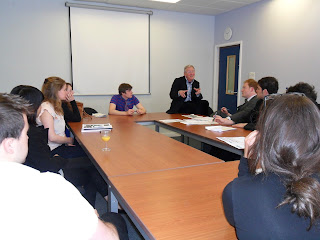Friday 27 April 2012
Students on the MSc Real Estate Management and the MSc International Real Estate took part in a mock Mediation Session last week.
Mediation is a form of alternative dispute resolution, a way of resolving disputes between two or more parties with concrete effects. Typically, a third party, the mediator, assists the parties to negotiate a settlement. More specifically, mediation has a structure, timetable and dynamics that "ordinary" negotiation lacks. The process is private and confidential, possibly enforced by law. Participation is typically voluntary. The mediator acts as a neutral third party and facilitates rather than directs the process (thanks Wikipedia).
The day started with an introduction to Mediation by Alan Gray from the Dispute Resolution Faculty at RICS. Then the students split into three teams of players and prepared for the role-play. The three teams were: the residents group; the planning authority and the developer.
The Mock Mediation started with the Mediator (played by Alan Gray) setting the scene for all three teams: the parties were trying to mediate a planning dispute instead of going to a planning inquiry.
This was followed by a joint session with the parties and an opening statement from each party. The Mediator then questioned the parties before holding a private session with each. The Mediator had agreed to hold further joint sessions with the parties over lunch. After lunch the private sessions continued. I (that's me, the Editor) came in at this point to take some photos and I hope these convey some of the heated discussions that were taking place, particularly in the Planning Authority's room.
The parties then came together for a joint session before discussing a settlement. Following the Mock Mediation everyone (staff, students, the parties and the players) took part in a plenary session and discussed the lessons learned from the role-play. Students and staff thanked Alan Gray for leading the day.
Students on the MSc Real Estate Management and the MSc International Real Estate took part in a mock Mediation Session last week.
Mediation is a form of alternative dispute resolution, a way of resolving disputes between two or more parties with concrete effects. Typically, a third party, the mediator, assists the parties to negotiate a settlement. More specifically, mediation has a structure, timetable and dynamics that "ordinary" negotiation lacks. The process is private and confidential, possibly enforced by law. Participation is typically voluntary. The mediator acts as a neutral third party and facilitates rather than directs the process (thanks Wikipedia).
The day started with an introduction to Mediation by Alan Gray from the Dispute Resolution Faculty at RICS. Then the students split into three teams of players and prepared for the role-play. The three teams were: the residents group; the planning authority and the developer.
The Mock Mediation started with the Mediator (played by Alan Gray) setting the scene for all three teams: the parties were trying to mediate a planning dispute instead of going to a planning inquiry.
This was followed by a joint session with the parties and an opening statement from each party. The Mediator then questioned the parties before holding a private session with each. The Mediator had agreed to hold further joint sessions with the parties over lunch. After lunch the private sessions continued. I (that's me, the Editor) came in at this point to take some photos and I hope these convey some of the heated discussions that were taking place, particularly in the Planning Authority's room.
 |
| The Planning Authority in full flow |
 |
| More discussions... |
 |
| The Developers |
 |
| Waiting for the Developers to make their entrance |
The parties then came together for a joint session before discussing a settlement. Following the Mock Mediation everyone (staff, students, the parties and the players) took part in a plenary session and discussed the lessons learned from the role-play. Students and staff thanked Alan Gray for leading the day.

No comments:
Post a Comment
Note: only a member of this blog may post a comment.